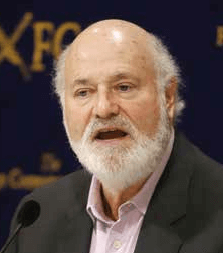Issue:
Rob Reiner trains his lens on a true story about journalism, jingoism and the drums of war.
THERE’S A BRILLIANT SCENE in the 1970s U.S. TV show All in the Family where Archie Bunker, a “lovable bigot,” meets his daughter’s hippy boyfriend for the first time. Looking over the headlines in a newspaper, they immediately begin arguing about the Vietnam War. When the boyfriend calls the conflict illegal and immoral, Bunker tells him, “You are a meathead… Dead from the neck up!” He then breaks into an overpowering rendition of “God Bless America,” causing the boyfriend to storm out.
Rob Reiner, the actor who played the boyfriend, is still protesting America’s overseas wars. He visited Japan in February to promote his latest film, the true story of Knight Ridder journalists Jonathan Landay and Warren Strobel who probed the official justifications for the U.S. invasion of Iraq in 2003. The title, Shock and Awe, refers to the battle plan concept developed at the National Defense University that was repeated by U.S. officials and parroted by U.S. news media.
Apart from directing, Reiner stars as Knight Ridder editor John Walcott, who has described the film as practically a word-for-word accurate representation of actual events. Reiner, known for iconic films like Stand By Me, When Harry Met Sally… and This Is Spinal Tap, visited the FCCJ to talk not only about why he wanted to make a movie about the George W. Bush administration but also today’s news media landscape.
“I was of draft age during the Vietnam War, and as we were running up to the war in Iraq in 2003 I was appalled that in my lifetime we would be engaging in war based on lies,” said Reiner. “We knew that there was no connection between Saddam Hussein and 9/11. We knew that there was no evidence of weapons of mass destruction, WMD. And we knew that the administration was using the fear of the American public in going forward and invading Iraq based on the ‘Project for a New American Century’, [a 1997 statement of principles] written by a bunch of neocons at a conservative think tank.”

“I believe mainstream media was not doing the due diligence it needed to do at the time”
THE FILM INCLUDES A 2002 clip of then Vice President Dick Cheney telling an audience, “Simply stated, there is no doubt that Saddam Hussein now has weapons of mass destruction.” Mainstream U.S. media swallowed this, hook, line and sinker, ignoring investigative reports written by Landay and Strobel, portrayed in the film by Woody Harrelson and James Marsden, respectively. The jingoist chorus for invasion grew as overwhelming as Bunker’s singing. The result, of course, was the fall of the Iraq regime and, according to the website Iraq Body Count, the violent deaths of over 280,000 civilians and combatants. U.S. weapons inspectors found no militarily significant WMD.
The war left a tragic, divisive legacy that was reflected in the film’s production. Some U.S. news media outlets refused to sell footage for use in Shock and Awe. Predictably enough, many American viewers didn’t warm to it either, with critics comparing it unfavorably to Reiner’s 1992 Oscar nominated court martial drama A Few Good Men. “It’s an important story to remember right now, assuming you can remember anything after being beaten over the head with talking points for 90 minutes,” Rolling Stone’s David Fear wrote. “The title is a misnomer.”
But Reiner didn’t seem to be phased when discussing his hopes for a better response in Japan, where the film was slated to debut in March 2019 under the title Kishatachi (journalists). He noted that, in a happy irony, journalists like Landay and Strobel are no longer media pariahs, thanks to the rise of a reality TV star to the presidency. Reiner said the U.S. news media has been “bifurcated” between outlets with a pro Donald Trump agenda and those that have returned to their watchdog role vis-à-vis the White House.
“CNN, NBC, Washington Post, New York Times are holding the president accountable and they’re working very hard at trying to get to the truth,” Reiner said. “That didn’t happen in the run up to his election. I believe mainstream media was not doing the due diligence it needed to do at the time, for a couple of reasons. One is I don’t think they thought he was going to win, and two, quite frankly, money. [Former CBS Corp. CEO] Les Moonves put it quite succinctly. He said ‘Donald Trump is bad for the country. He’s good for CBS.’”
All in the Family also aired on CBS, and no doubt Archie Bunker would have cheered Trump’s refrain of “fake news.” The anti war boyfriend though, would probably respond with a line from Shock and Awe that Reiner’s Walcott delivers to his troops: “When the government says something, you only have one question to ask: Is it true?” If American news media today does its job, future scholars of journalism may look back and say, “Those were the days.”
Tim Hornyak is a freelance writer who has worked for IDG News, CNET News, Lonely Planet and other media. He is the author of Loving the Machine: The Art and Science of Japanese Robots.

